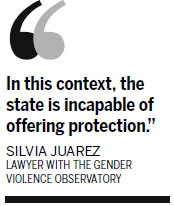El Salvador's street gangs use rape, sexual abuse to terrorize communities
In a country terrorized by gangsters, it is left to the dead to break the silence on sexual violence.
Rather, to the bodies of dead women and girls, sometimes cut in pieces, pulled from clandestine graves. They attest to the sadistic abuse committed by members of street gangs who take girlfriends, discard them when they know too much, then deliver them up for group rape and murder.
Even those who gather statistics say there are no reliable numbers on sexual violence in El Salvador. Threats prevent many from reporting attacks. Others who have grown up amid rampant abuse may not even recognize rape as a crime. Still others flee the country for safety rather than seek justice from a system that more often delivers impunity.
US immigration attorneys say there has been a dramatic increase in the last year in the number of women and girls from Central America seeking asylum in the United States after having been kidnapped and raped.

"We are seeing an exponential increase," said Lindsay Toczylowski, a lawyer with Catholic Charities in Los Angeles. "It's the evolution of gang warfare, what's going on in Honduras and El Salvador. It's what we see in other war situations around the world where rape is used as a weapon to terrorize the community."
El Salvador's 6 million people also suffer the second-highest per capita homicide rate in the world after neighboring Honduras.
Most of the violence is the handiwork of the Mara Salvatrucha and 18th Street gangs, which were formed by migrants in the US, then returned home and grew into warring forces of tens of thousands of gangsters.
The official numbers show just 239 women and girls among the murdered so far this year, about a tenth the number of men, with an additional 201 reported missing. Through August, 361 rapes were reported, two-thirds of them against minors. But the statistics don't begin to tell the story.
Worldwide, women generally report only 20 percent of rapes, according to the World Health Organization, and that percentage is likely lower in El Salvador. The missing and dead also may be underreported.
"We have cases in which the mother knows how her daughter died, but she cannot talk because the gangsters who raped and killed her have come to the wake to offer condolences for their girlfriend," said Silvia Juarez, a lawyer with the Gender Violence Observatory. "In this context, the state is incapable of offering protection."
Criminologist Israel Ticas, who digs up clandestine graves for the Attorney General's Office, says more than half of the 90 sites he has excavated in the last 12 years have contained the remains of murdered women and girls. "For sure there are hundreds of these cases and maybe thousands out there," Ticas said.
(China Daily 11/07/2014 page11)












